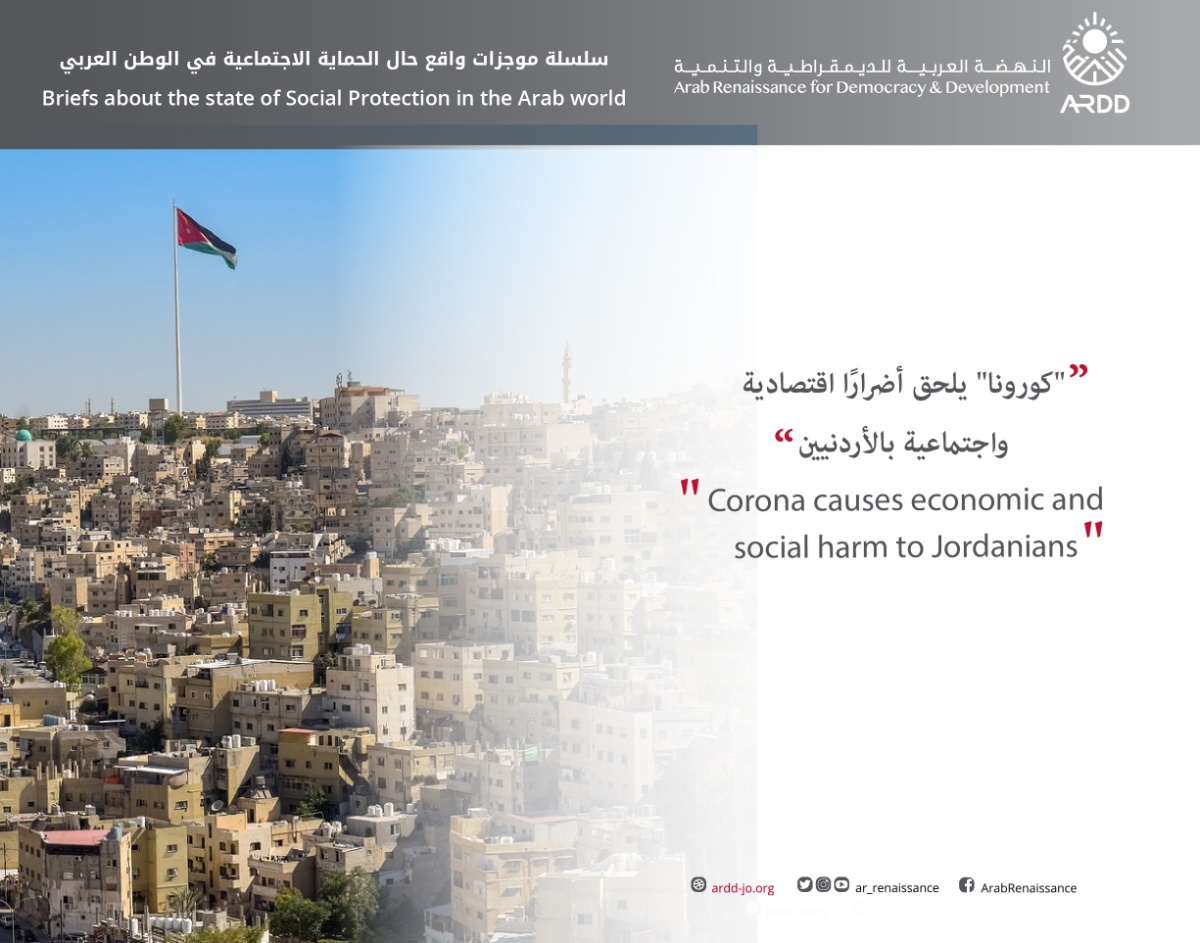Since the escalations of the coronavirus pandemic in the Kingdom of Jordan, the government has been dealing with the increasing numbers of cases and the whole situation in confusion and, at times, hesitantly, and that negatively affected the economy, and the health and social life of citizens.
The situation revealed the reality of social protection in the Kingdom and raised demands for effective laws and systems, and the establishment of solid institutions capable of surmounting the challenges posed by the pandemic.
The Arab Renaissance for Democracy and Development (ARDD) took note of these challenges and worked on a series of briefs about the reality of social protection in the Arab world. In this brief, ARDD documents the measures and responses the Kingdom took to deal with the corona pandemic and to protect vulnerable groups such as the poor, the elderly, children, day laborers, migrants, refugees and people with disabilities.
The government took economic measures affecting the income of most employees in both public and private sectors, and announced its biggest social protection program targeting around 400,000 families of people unemployed and harmed by the coronavirus crisis.
Since March, the government took 220 measures in response to coronavirus. Among the prominent measures are the ones in support of day laborers and that target hundreds of thousands of families harmed by redundancies. This support included non-Jordanian children of Jordanian mothers married to foreigners and people from the Gaza Strip(1).
Households of two were supported with JD70 ($100), and households of three or more got JD136 (around $192). The total of this monetary support reached JD27 million ($38 million) per month(2).
According to a study by UNICEF, the number of households with a monthly income below JD100 ($140) doubled since the pandemic started. The study also shows that, due to the pandemic, 17% of children under 5 did not receive basic vaccinations, and 23% of children who got sick during the pandemic failed to receive proper medical care(3).
According to a policy paper by Sisterhood is Global Institute Jordan (SIGI), indicators suggest a rise in gender-based violence during the pandemic. The conclusion was reached based on 800 cases of psychological, physical and economic violence targeting women, children and people with disabilities that SIGI had dealt with(4).
Human rights defenders and specialists say there is a serious shortage of medical and nursing services specialized in elderly care and illnesses, at a time characterized by an absence of information about their situation in homes for the elderly.
The Higher Council for the Rights of Persons with Disabilities activated a hotline service to answer questions and receive urgent support requests. Focal points were assigned in different governorates and TV channels were provided with sign language interpreters to ensure that people with impaired hearing are kept well informed(5).
As part of the government’s response to the pandemic, 1,500 people detained for misdemeanors and whose cases are still in the process of being ruled upon were temporarily released and will be detained again once the country recovers from the pandemic(6).
The coronavirus crisis did not spare refugees, among whom poverty increased to 79%. They were affected by lockdown, curfew and limited movement, especially women in the unorganized sectors, and the aid provided to them by international and civil society organizations is insufficient(7).
Since the pandemic started, there have been increased calls to provide civil society organizations in Jordan with the space needed to function, by, for example, allowing their representatives to be part of the “crisis cell” and contribute, through their experience, to policy making and finding ways to deal with the pandemic. Calls were also made to allow these organizations freedom of movement to be able to contribute to the effort to help the most vulnerable groups(8).
Social and youth initiatives were not any less prominent in Jordan. They contributed to alleviating the economic effects on the least cared for and provide them with services. Civil society organizations also launched numerous initiatives targeting groups such as the elderly, people with disabilities and refugees.
Now that Jordan is resigned to “coexisting with the Corona pandemic”, it is essential for the government to display “moderation” in its decisions to fight it, especially those affecting the economic, social and psychological state of the people. To face challenges, it is vital to establish proper social protection systems and measures, and a social security network.
(3) UNICEF: 68% of Jordanian Households Lost Jobs Due to Corona
(4) SIGI: Rise in Gender-Based Violence During the Corona Pandemic
(5) The Higher Council Takes Measures to Serve People with Disabilities and Their Families
(6) Jordan Releases 1,500 Prisoners in Efforts to Face Corona
(7) Refugees in Jordan Poorer Due to Corona
(8) Civil Society in Jordan… Marginalised Institutions Amid Corona



